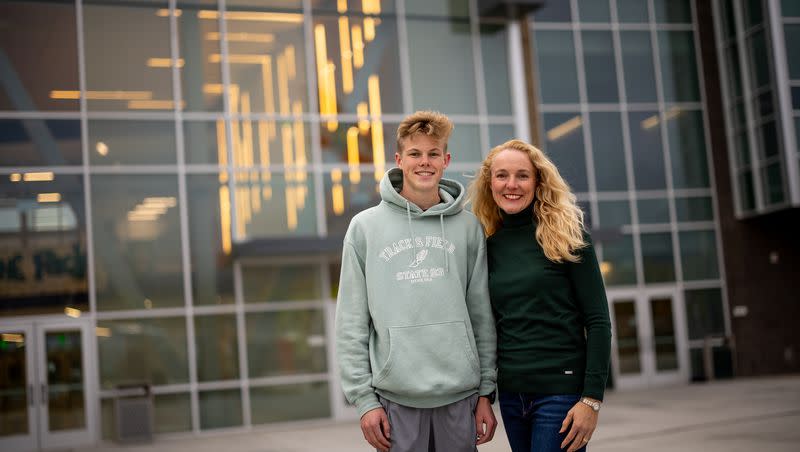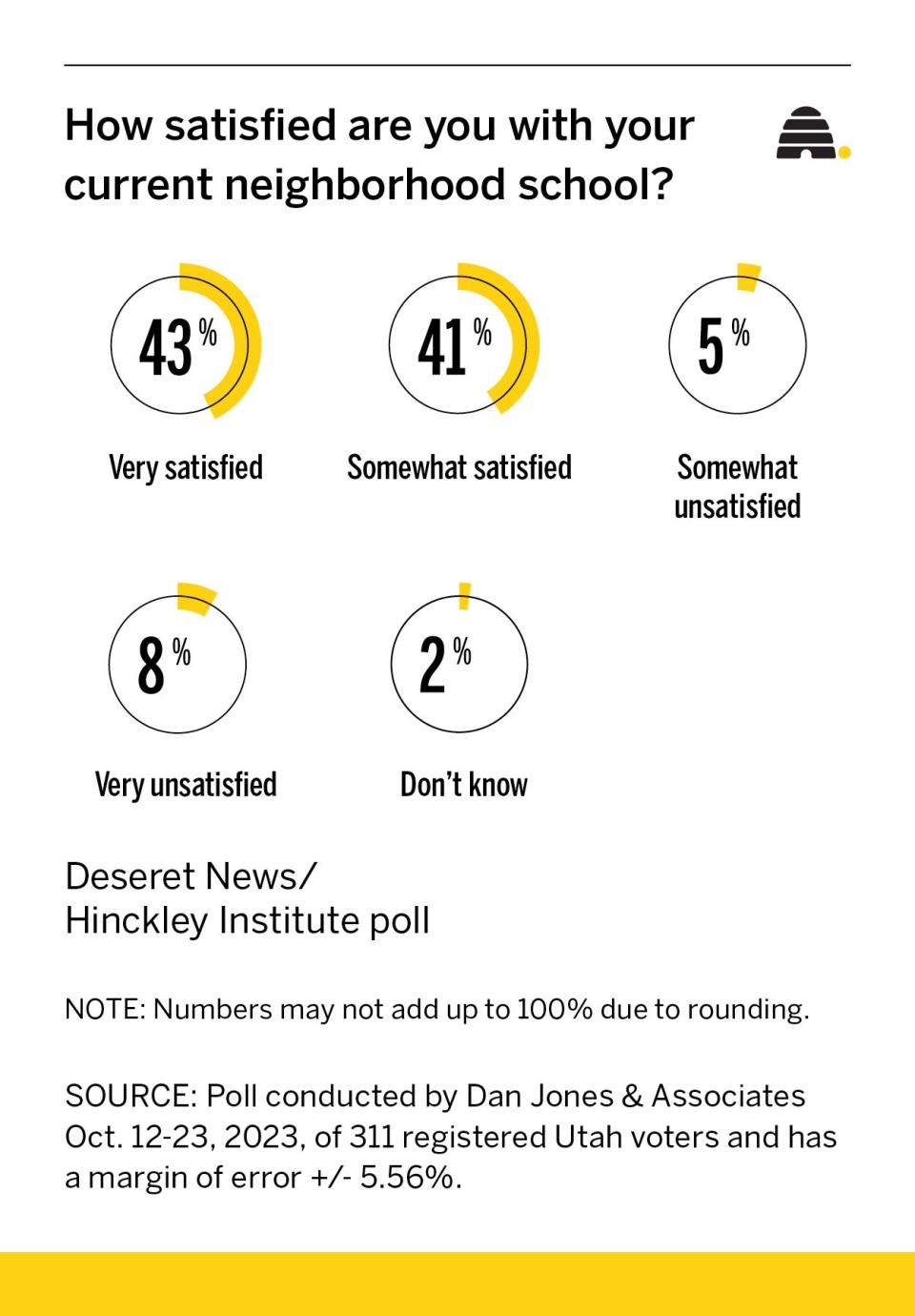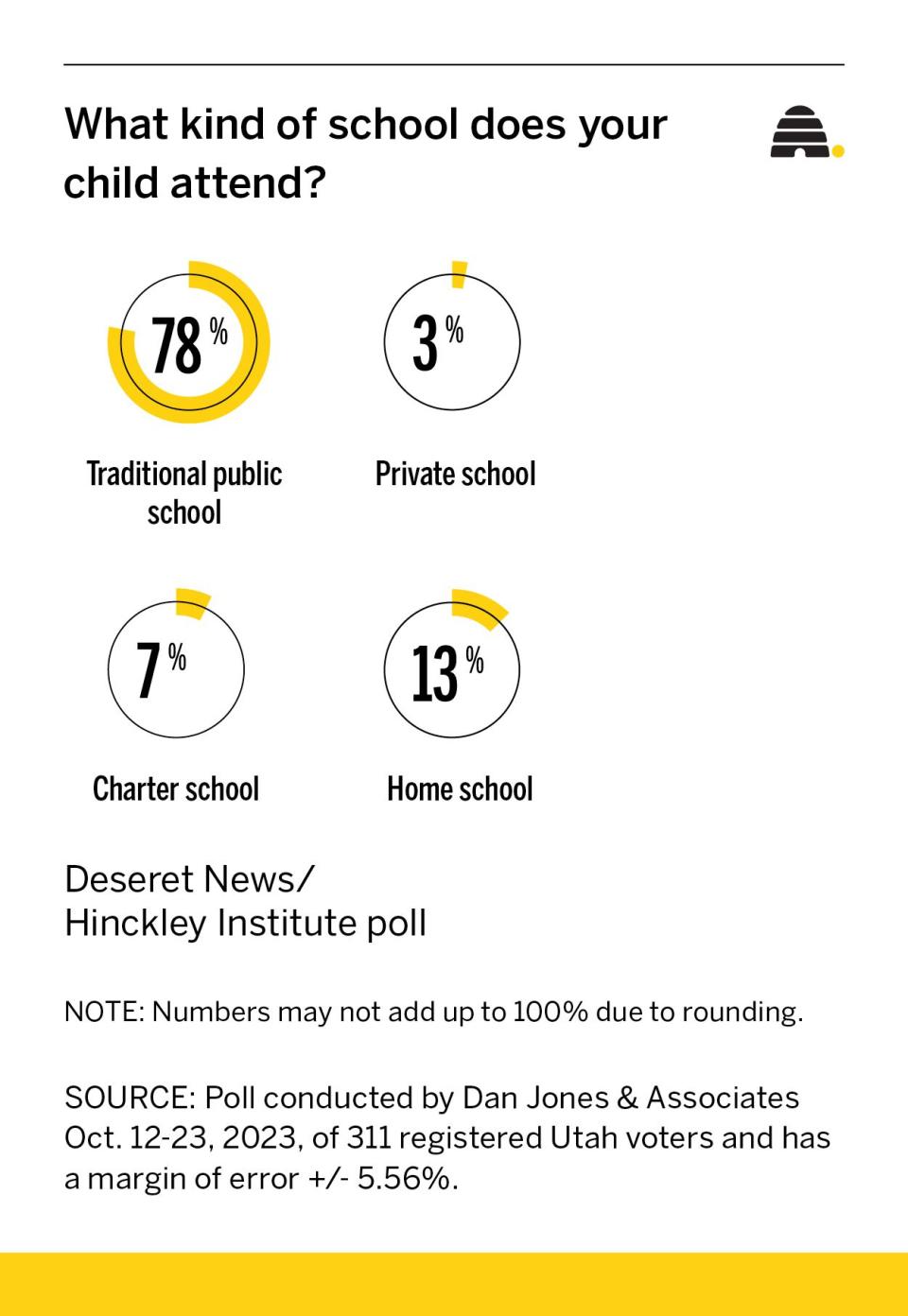We asked Utah parents if they are satisfied with their neighborhood schools. Here’s what they told us

Rebecca Martin is deeply invested in public schools, so much so that she is serving her third consecutive year as president of Hillcrest High School’s Parent Teacher Student Association.
That was preceded by two years as PTA president at the elementary level and two years at the middle school level.
Her commitment stems from her vested interest in the education that her four children have received in public schools, she said.
Related
Her youngest child Joshua is a junior at Hillcrest and her three other children are Hillcrest alumni, two of whom are serving church missions and the other attending BYU.
But it is also about her bedrock belief in the institution of public education.
“I love that our educational system is open to anyone, anyone who wants to participate in it can come to school, come learn. To me, that’s what education is, opening our minds,” Martin said.
For her family, the education her children have received in Canyons School District has met all of their needs, which has included extra academic resources, opportunities to participate in clubs, activities and athletics, she said.
“They’ve just been able to be in all kinds of sports and theater and activities as well as their academics. The public school has just met all the needs that we wanted out of the school system,” she said.
A recent poll of parents of school-age children conducted for the Deseret News and the Hinckley Institute of Politics largely indicated satisfaction with their neighborhood schools.

According to the poll results, 84% said they are satisfied with their neighborhood schools with 43% reporting they are “very satisfied” and 41% “somewhat satisfied.” The Dan Jones & Associates survey of 311 parents had a plus or minus margin of error of 5.56%
Meanwhile, 5% said they were “somewhat unsatisfied” and 8% said they were “very unsatisfied.”
Renée Pinkney, president of the Utah Education Association, said the poll results are consistent with “what we already know, parents and kids are really happy with their neighborhood public schools. They love their teachers and other educators. They appreciate the school community and the extension that that has in the greater community,” she said.
It is especially true in rural communities, where schools are essential gathering places, whether the community is turning out for a football game or to attend a school play, she said.
“That sense of community is strong. The idea that you have parents and teachers who are working in partnership to make sure that their child and student is successful and thriving, and happy. All of those things, it’s just so important,” she said.

According to the poll results, 78% of the registered voters who have school-age children send their children to traditional public schools, 7% go to public charter schools, 3% attend private schools and 13% are home-schooled.
The poll results suggest lukewarm interest in the nascent Utah Fits All Scholarship, which is scheduled to launch next fall. Parents can apply for up to $8,000 in state funding that can be used for home-schooling, to attend private school or other education services.
Sixty-five percent of parents who responded to the poll said they do not plan to apply for the choice scholarship while 8% said they “definitely” do. Nineteen percent responded “maybe” and 8% said “don’t know.”

Rep. Candice Pierucci, R-Herriman, who sponsored HB215, the legislation that created the scholarship program, said the poll results indicate that more than a quarter of the respondents will apply or are interested in the option.
“I’m encouraged by those numbers and it’s not surprising. Since I passed the bill, I’ve gotten tons of emails from families all across the state, asking me where they go to apply for the scholarship and many were assuming it will be effective this fall,” she said. Under the legislation, the program will go into effect the fall of 2024.
Based on “organic feedback” she’s received, Pierucci said many parents have expressed that “they’re excited about an alternative option that helps them customize their kids’ education.”
HB215 represented a sea change in Utah education policy in that it expands the use of public money for private education choices far beyond existing programs for families of children with disabilities. The Utah Fits All Scholarship program could serve close to 5,000 students its first year.
Martin said she was firmly opposed to HB215, passed by the Utah Legislature in the early days of their 2023 general session. The legislation also gave licensed educators a $6,000 pay raise.
The 65% of parents polled who said they do not plan to apply for the scholarship are likely families “whose needs are being met in the public school system. I feel like the Utah fits all scholarship is a misguided at best attempt to take resources from our public school system and put it into other educational structures that have a lot less accountability,” Martin said.
Pinkney said the poll results would likely differ considerably depending upon where one lives. In rural Utah, the communities are deeply dependent upon their local public schools. Even though they would be eligible to apply, there are fewer alternatives in those communities compared to the Wasatch Front, aside from online learning and home education.
“I think that what the data is saying to me, is that our neighborhood public schools are the preferred method of educating our kids in Utah and that there are very few people who are definitely planning to apply for the Utah Fits All Scholarship and that we know that our public schools are supported by their community. That’s pretty much what I see in this data without having all of the ins and outs of the universe that they polled,” Pinkney said.
Martin said one of the things that she relishes about public schools is that they are “the melting pot of America” and places where anyone can receive “a free, quality education and be together with your neighbors, with your friends with people who are like you and not like you,” she said.
As a parent, Martin said she likes that her children “have been exposed to lots of different people that are not like them. They’ve been able to go to school with people from all walks of life, from all educational aspirations, and they have learned from that experience. When they’re walking down the halls, everybody doesn’t look like them. They’ve been able to meet people from other countries and other religions and other backgrounds and other socioeconomic groups so their experience is so much broader.”

